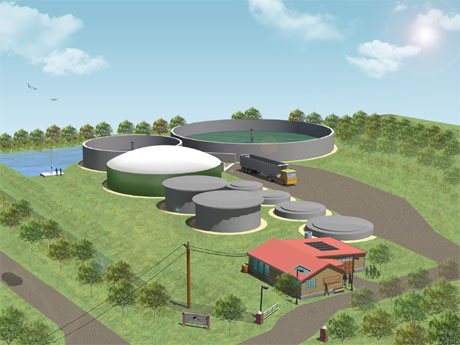When life gives you poo, make a biogas plant.
Daniel Bida, the founder of Zooshare Biogas Co-operative Inc., has probably heard that joke or something like it about a million times. It’s just the sort of potty humour that he’s prone to, thanks to his plan to create a non-profit renewable energy cooperative that hinges on the construction of a 500 kW biogas plant at the Toronto Zoo. Yes, Bida plans to take the manure of lions and tigers and bear, and oh my – turn it into electricity.
“Everyone sees it as permission to make shameless poo jokes,” Bida says. “You don’t usually get to make those sort of puns.”
But when you do, it sure smells sweet. As do the prospects for the future of biogas power in Ontario, when Bida – who runs a firm called Regenerate Biogas – lays them out. His business model sees organic waste products that’s normally sent to landfills or compost facilities instead diverted to biogas plants. He estimates there is about 250 MW of potential biogas power to be produced from livestock manure and commercial food waste in Ontario.
ZooShare has won funding from the Ontario Power Authority through its Community Energy Partnerships Program and the Toronto Community Foundation. It’s looking to raise the $5.4 million needed to build the biogas plant, create facilities, and connect to the grid with a style of crowdfunding.

A visualizaiton of ZooShare’s biogas plant site.
“It’s an attractive offering that you could hold in your RRSP portfolio,” Bida says. “It’s not just a bond that you could buy and get the return. It gives our members an opportunity to play an active role in the biogas community.”
ZooShare asks community members to join its cooperative board for $100. In exchange, they receive $100 credit towards the first bond they purchase, which is advertised as offering a seven per cent annual return over seven years. That’s not too shabby considering today’s interest rates being offered by savings accounts and GICs.
It’s a structure that is similar to equity-based crowdfunding, which is being advocated for in Canada by the Invest Crowdfund Canada movement and the Canadian Advanced Technology Alliance. But instead of owning shares of a for-profit company, this is a cooperative board that is non-profit and would focus on returning money to investors and funding the zoo. There are no common shares to be sold, but bonds instead.
ZooShare is also multi-faceted when it comes to revenue generation. It will sell electricity either to the province or to the zoo, or natural gas to a gas retailer. But it will also collect fees from the grocery stores where it collects food waste (stores currently pay to have waste hauled away for compost), and earn on the sale of its by-product that could be branded something like Zoo Poo fertilizer and sold on store shelves.
“A major part of ZooShare’s mission is to educate the public,” Bida says. “The waste we produce isn’t a problem to deal with, but a very valuable resource that if we as a society put it to use can use it as a n energy resource and as fertilizer, closing the loop on the production process.”
To go ahead with his plan, Bida is hoping to win a Feed-in Tariff contract with the Ontario Power Authority. He submitted his application before the Dec. 14 deadline, but the process could take four months to decide what could receive funding.
If it does get funded, that’s when the poo will really start to hit the fan.




 Brian Jackson is the Editor at ITBusiness.ca. E-mail him at
Brian Jackson is the Editor at ITBusiness.ca. E-mail him at 